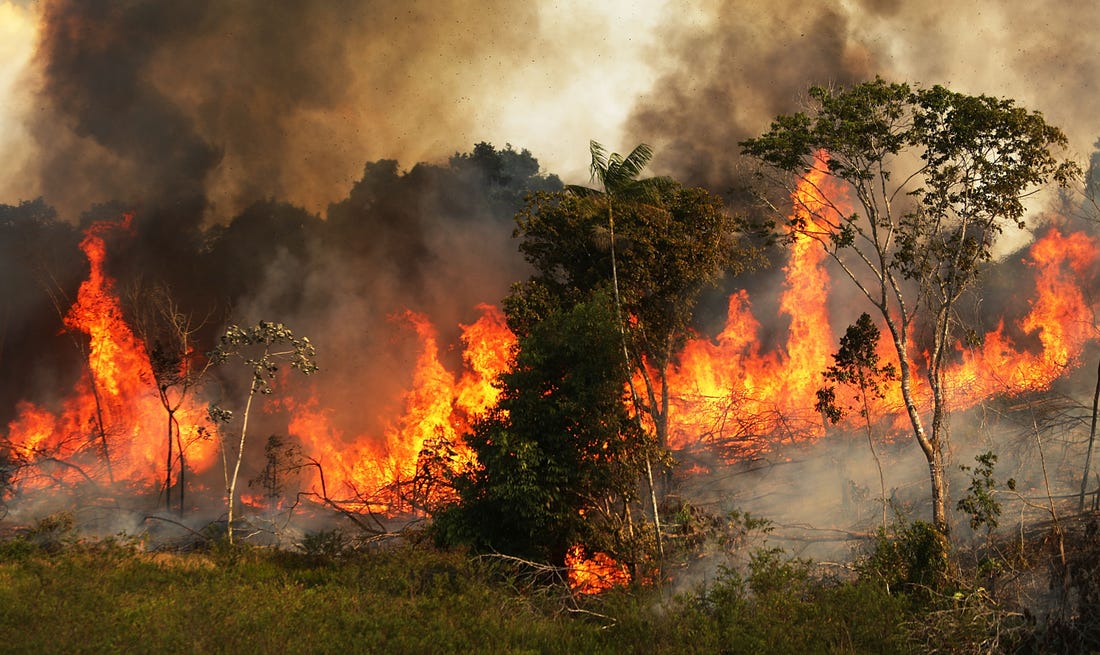RIO DE JANEIRO, BRAZIL – More than half a million hectares of forest are burning in the Bolivian department of Santa Cruz, at the edge of the Amazon, which faces two successive years of drought and high temperatures.
The country’s interim president, Jeanine Áñez, declared a “national emergency” on Wednesday, which will enable her to benefit from international aid to extinguish the fires. As a result, she distances herself from her predecessor, Evo Morales, who last year faced a similar situation, but refused to decree the emergency, ignoring appeals from residents of eastern Bolivia. He argued that the country could solve the problem on its own.
This year’s fires are so far much more contained than in 2019, which were particularly severe, but they share a common characteristic with their proximity to presidential elections, with the consequent political gamble they entail.

“They’re asking if we’ll turn to international aid… we say we’ll absolutely turn to everything that helps us control the fires, to avoid the misfortune we experienced last year,” Áñez said. The president also promised to take drastic action against those responsible for the fires, if she succeeds in identifying them.
Analysts and historians consider that Morales’ downfall began with the reaction of part of public opinion to the fires that a year ago destroyed five million hectares and were particularly distressing for the population of Santa Cruz, because they compromised the dry forest of an area called Chiquitanía, where the wood is very valuable and used in regional crafts and architecture.
As a result of this disaster, the opposition organized large protests against Morales a few weeks before the elections, which would then be challenged for fraud and were ultimately annulled amid a severe political crisis.
Now, the Chiquitania jungle is again at risk. Áñez said that stifling the fires is her top priority, above the election campaign in which she is involved, although so far she has not been among the favorite candidates. In parallel, she overturned a decree from her predecessor Morales that authorized deforestation to enable farming activities and the use of chaqueo (controlled patch burning) for this purpose.
This decree is believed to have intensified the fires traditionally conducted by farmers after each harvest in the last days of winter, to make the land easier to till with hoes. The Bolivian Cabinet has announced that it will initiate a civil case against ex-president Morales, who is already a defendant in approximately a dozen lawsuits alleging a variety of crimes.
Environmentalists consider Áñez’s gesture to be insufficient and of a purely electoral nature, since the decree she has overturned is only a small component in the set of regulations that promote the extension of crops and pastures in Santa Cruz and other parts of the country, and which the activists call “arson laws”.
The causes behind the unusual magnitude and recurrence of forest fires in Santa Cruz are intensely debated. For the region’s political leaders, the fires began with the arrival of indigenous communities from the so-called “highlands” to the Chiquitanía plain, who do not know how to adequately care for the forest.
According to environmental organizations, they are the result of farmers’ ambition to expand their crops and pastures at the expense of forest areas. The 2020-2030 Livestock Development Plan establishes an increase from 13 to 20 million hectares in the area dedicated to this activity. The past government agreed with the agribusiness companies that the cultivated area would be expanded from 2.5 million to 10 million hectares.
These plans, if implemented, would require substantial deforestation, since the territory committed is mostly composed of forests. Environmentalists regard them as “predators”. When Morales was president, as the first peasant to rule the country, he concurred with livestock producers and agribusiness companies to radically increase land exploitation. On the other hand, he clashed with these same elites because of the migration of Aymara and Quechua Indians to Santa Cruz.
So far, the interim government of Áñez, which changed many of the previous government’s guidelines, had not amended any of the “arson laws” it has inherited. On the other hand, it has eased and increased the import of genetically modified seeds, a measure that is also considered favorable to deforestation. The president was born in Beni, an Amazonian department with great livestock activity, on the border with the Brazilian state Rondônia. Her party is the Social Democratic Movement, which originates from eastern Bolivia and is therefore closely related to the national agro-industry.
Source: El País

